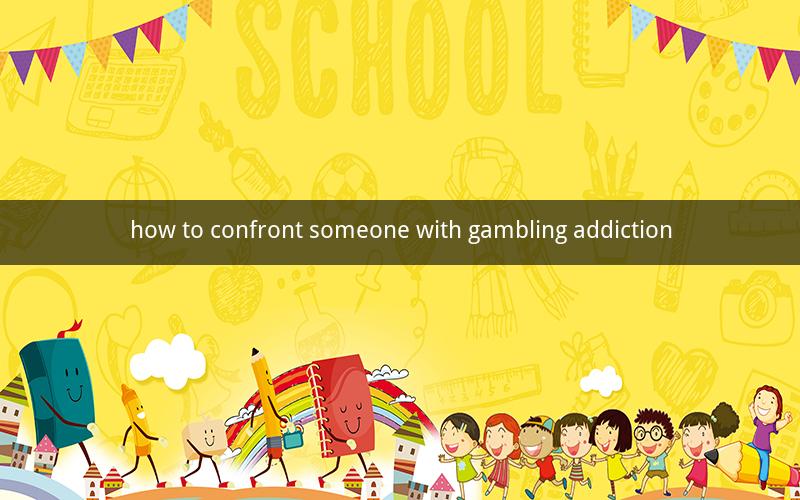
Confronting Someone with Gambling Addiction: A Comprehensive Guide
Table of Contents
1. Understanding Gambling Addiction
2. The Importance of Confrontation
3. Preparing for the Conversation
4. Approaching the Topic
5. What to Say
6. Active Listening
7. Supporting the Individual
8. Encouraging Professional Help
9. Dealing with Resistance
10. Maintaining Communication
11. Aftermath and Next Steps
1. Understanding Gambling Addiction
Gambling addiction, also known as compulsive gambling, is a behavioral disorder characterized by an inability to control the urge to gamble. It is a complex condition that can have severe consequences on an individual's financial, social, and emotional well-being. Understanding the nature of gambling addiction is crucial before attempting to confront someone struggling with it.
2. The Importance of Confrontation
Confronting someone with a gambling addiction is a challenging but necessary step towards helping them seek treatment and recovery. It is important to approach the conversation with empathy, understanding, and a willingness to support the individual through their journey.
3. Preparing for the Conversation
Before initiating the conversation, it is essential to prepare yourself emotionally and mentally. Reflect on your own feelings, set clear goals for the discussion, and consider the best time and place to have the conversation.
4. Approaching the Topic
When approaching the topic of gambling addiction, it is crucial to do so in a non-accusatory manner. Choose a private and comfortable setting, and ensure that both parties are in a calm state of mind.
5. What to Say
Here are some key points to include in the conversation:
- Express your concern for the individual's well-being.
- Use "I" statements to avoid sounding accusatory.
- Acknowledge the difficulty of the situation for both parties.
- Highlight the negative consequences of gambling addiction.
- Offer support and encouragement.
6. Active Listening
Active listening is a vital skill during the conversation. Show genuine interest in the individual's feelings and experiences. Avoid interrupting, and provide reassurance that you are there to support them.
7. Supporting the Individual
Supporting someone with a gambling addiction involves more than just talking. Offer practical assistance, such as helping them find treatment options or accompanying them to appointments. Be patient and understanding, as recovery is a long and challenging process.
8. Encouraging Professional Help
Professional help is crucial for individuals struggling with gambling addiction. Encourage the person to seek therapy, counseling, or support groups. Provide information on available resources and offer to help them make the necessary arrangements.
9. Dealing with Resistance
It is common for individuals with gambling addiction to resist seeking help. Be prepared for this and remain calm and persistent. Focus on the positive outcomes of treatment and emphasize that you are there to support them throughout the process.
10. Maintaining Communication
Maintaining open and honest communication is essential after the initial confrontation. Regularly check in on the individual's progress, offer support, and encourage them to share their feelings and experiences.
11. Aftermath and Next Steps
After the confrontation, it is important to take the necessary steps to ensure the individual's well-being. This may include:
- Continuing to offer support and encouragement.
- Monitoring the individual's financial and social situation.
- Encouraging them to participate in self-help groups or therapy sessions.
- Being prepared to intervene if the situation worsens.
Questions and Answers
1. Q: How can I approach the topic of gambling addiction without causing the individual to become defensive?
A: Use "I" statements to express your concerns and focus on the impact of the addiction on their well-being rather than on their behavior.
2. Q: What if the individual denies having a gambling addiction?
A: Acknowledge their denial and continue to express your concerns. Offer to provide information on gambling addiction and its consequences.
3. Q: How can I support someone who is resistant to seeking help?
A: Be patient and persistent. Offer to help them find treatment options and accompany them to appointments.
4. Q: What resources are available for individuals struggling with gambling addiction?
A: There are various resources available, including therapy, counseling, support groups, and hotlines. Research local and national organizations that specialize in gambling addiction.
5. Q: How can I maintain open communication with someone who is struggling with gambling addiction?
A: Regularly check in on their progress, offer support, and encourage them to share their feelings and experiences.
6. Q: What should I do if the individual's gambling addiction is causing financial problems?
A: Help them create a budget, offer to assist with managing their finances, and encourage them to seek professional help.
7. Q: How can I help someone who is struggling with gambling addiction in their social life?
A: Encourage them to participate in social activities that do not involve gambling and offer to accompany them to these events.
8. Q: What if the individual's gambling addiction is affecting their family life?
A: Encourage them to seek family therapy or counseling to address the impact of their addiction on their relationships.
9. Q: How can I support someone who is in the early stages of recovery from gambling addiction?
A: Offer practical assistance, such as helping them find treatment options or accompanying them to appointments.
10. Q: What should I do if the individual's gambling addiction worsens despite their efforts to seek help?
A: Remain supportive and encourage them to seek additional help, such as more intensive therapy or residential treatment programs.